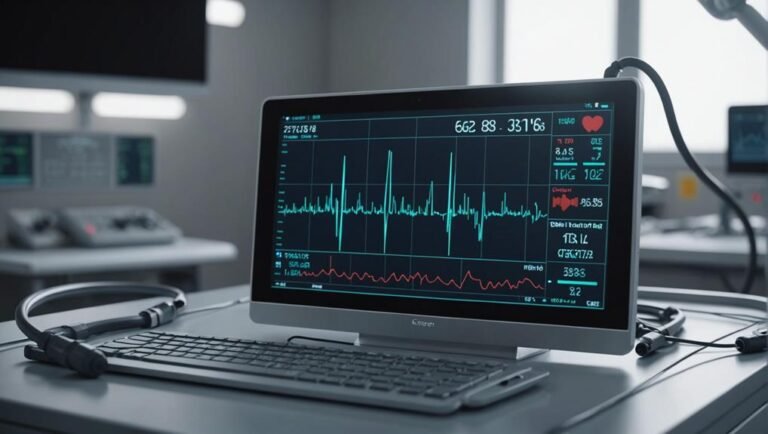Revitalize Your Energy: Combat Fatigue Wisely
Feeling constantly fatigued? Take charge and combat fatigue wisely to revitalize your energy. Address emotional fatigue through mindfulness and support. Manage stress with activities like yoga and meditation. Evaluate lifestyle habits for energy balance. Prioritize tasks, incorporate exercise, and eat well. Try mind-body techniques and consider energy-boosting supplements under professional guidance. Stay hydrated, consume nutrient-rich foods, and avoid excessive caffeine and sugar. Enhance energy with regular exercise and a balanced diet. Safely nurture your energy levels to feel revitalized and thriving.
Key Takeaways
- Practice mindfulness and seek support to alleviate emotional fatigue.
- Incorporate stress-reducing activities like yoga and meditation.
- Prioritize tasks, avoid overcommitting, and evaluate lifestyle habits.
- Consider energy-boosting supplements like vitamin B12 with professional guidance.
- Maintain hydration, balanced diet, and exercise for sustainable energy levels.
Understanding Fatigue: A Comprehensive Overview
Feeling exhausted and worn out can stem from a variety of factors that affect your physical, mental, and emotional well-being. Emotional fatigue, caused by stress and everyday challenges, can greatly impact your energy levels. Coping mechanisms such as mindfulness, relaxation techniques, and seeking support from loved ones can help alleviate emotional fatigue.
Stress plays a critical role in draining your energy, making it essential to manage stress effectively. Practicing stress-reducing activities like yoga, meditation, or engaging in hobbies can improve your overall energy levels. By understanding the impact of stress on your energy and implementing effective coping strategies, you can combat fatigue and revitalize your well-being.
Identifying Causes of Low Energy
Understanding the root causes behind your low energy levels is key to effectively combatting fatigue and restoring energy to your daily life. Lifestyle changes play a significant role in managing energy levels. Evaluate your daily routine for opportunities to incorporate exercise, a balanced diet, and adequate rest.
Energy preservation is essential; prioritize tasks, delegate when possible, and avoid overcommitting yourself. Consider how stress, poor sleep habits, and a sedentary lifestyle may be contributing to your fatigue. Making small adjustments, such as setting aside time for relaxation, staying hydrated, and reducing screen time before bed, can have a big impact.
Effective Fatigue Management Strategies
To effectively manage fatigue, implementing tailored strategies that address both physical and mental aspects is essential for restoring your energy levels and overall well-being.
Incorporating mind-body techniques such as meditation, yoga, or deep breathing exercises can help reduce stress and improve mental clarity, contributing to a more energized state.
Additionally, considering energy-boosting supplements like vitamin B12, iron, or ginseng may provide the necessary nutrients to support your body's energy production. Remember to consult with a healthcare professional before starting any new supplements.
Nutritional Tips for Boosting Energy
For a natural energy boost, consider incorporating nutrient-rich foods into your daily diet to enhance your vitality and combat fatigue effectively.
Start by prioritizing hydration; staying well-hydrated is important for maintaining energy levels throughout the day.
Additionally, focus on consuming foods that are high in vitamins, minerals, and antioxidants to support your body's energy production.
Energy boosting supplements can also be beneficial, but make sure they're safe and suitable for your individual needs.
Remember, a balanced diet, along with proper hydration and targeted supplements, can work together synergistically to revitalize your energy levels and help you combat fatigue wisely.
Stay mindful of what you eat and drink to power up your day naturally.
Sustainable Energy Boosters for Daily Life
Boost your daily energy levels sustainably with simple lifestyle adjustments that promote lasting vitality and combat fatigue effectively. Consider incorporating the following sustainable energy boosters into your daily routine:
- Prioritize regular exercise to enhance energy-promoting neurotransmitters in your brain.
- Maintain a healthy balanced diet rich in fruits, vegetables, whole grains, and protein to support your energy balance.
- Avoid relying on sugary snacks for quick energy boosts as they may lead to subsequent crashes.
- Only consider vitamin supplements for energy if a deficiency has been diagnosed by a healthcare professional.
- Remember to consume caffeine in moderation to prevent disruptions in your sleep patterns and overall energy levels.
Conclusion
Now that you have armed yourself with knowledge and practical strategies to combat fatigue wisely, it's time to take action and revitalize your energy.
Remember, Rome wasn't built in a day, so be patient with yourself as you implement these changes.
Just like a seed needs time to grow into a flourishing plant, your energy levels will gradually improve with consistent effort.
Stay committed and watch as your energy blossoms like a beautiful flower in full bloom.







